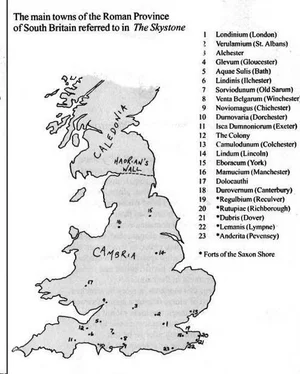He visited me the morning he left and wished me Godspeed in my recovery, promising that if he ever passed by way of Colchester, he would find my smithy and visit me. We clasped hands and parted as friends. I had been returned to regulation sick bay by this time, tended by the regular medics, and I suppose I was feeling sorry for myself. The fact that Britannicus had gone, however, made me face up to my problems. I could either languish and die in bed, or I could set myself to making the best I could of a crippled leg. I set out to beat my handicap, and I won. Most of the physicians and surgeons who had examined my injuries — and there had been many over the months since I had been wounded — were of the professional opinion that I would never walk upright again. I was determined to prove them wrong, and I was intensely grateful that there were others, equally qualified, who did not share their opinions. One of the most scathing of these was Comius Attribatus, a brilliant surgeon of mixed Roman and Celtic blood who was also a grey-bearded veteran of thirty years in the army medical corps. There was nothing Comius had not seen in the way of wounds over three decades, he told me, and he swore that he had known men with wounds far worse than mine who had forced their bodies to conform to their will and learned to walk again, when reason and logic said they should have been cripples forever. I devoured his words, never able to hear enough of such stories, choosing to believe him because I wanted to more than anything else in the world. Under his close supervision I set out to retrain my cut and wasted muscles. It was agonizing, lonely and frustrating work, and my progress was very, very slow. But I soon began to make visible progress, and even the most sceptical watchers came to believe I would win, and to lend their support to my efforts. I sweated off every trace of fat on my body, and gradually, shaking and quivering with sustained effort, I replaced it all with healthy, corded layers of muscle. My left leg had been shattered, of course, the muscles torn and poorly reconstructed, in spite of the excellent work of the physicians, and that was something I had to accept as a limitation. But after six months of exercise and effort, the leg worked. I could walk on it. It was a limping walk, hesitant at times, but it was real Eight months after the return of Caius Britannicus to duty, in the dead of winter, I arrived home in Colchester, looking as good as ever on horseback, but limping like a lame duck when I tried to walk.
BOOK TWO - Colchester
VI
My grandfather's smithy—now my smithy—was empty when I arrived. There were no fastenings on the doors, which hung limp and weary-looking in their frames. I inspected the premises and found nothing — no anvils, no tools — nothing. The forge itself lay cold, its grill thick with rust. Around the walls, dilapidated wooden shelves hung limp and empty, sagging wearily under a heavy coating of dust. The place hadn't been used in years, it seemed, although it had been my understanding that one of my mother's brothers had taken it over after my grandfather's death, just to keep it safe for my return. I closed the doors and made my way to my grandfather's house, where I found a family of cousins in residence. To say that they were surprised to see me would be an understatement. To say that they were glad to see me would be an outright lie. They had thought me safely dead in the invasion, as were my uncle and his wife. Now here I was on the doorstep, alive and reasonably healthy, expecting to take possession of my house, which meant that they were dispossessed. Thinking back on it now, I might have been disposed to let them stay had they shown me any sign of welcome on my arrival, but they lacked even the civility to hide their disappointment at my survival; they seemed to go out of their way to antagonize me. I admit, however, that with the pain in my leg, the disappointment of finding the smithy abandoned and the long journey I had made, I was not difficult to anger.
Anyway, they moved out. Quickly. And I was home. The house was filthy, but I had good memories of the place. It was fairly spacious, in the Roman townhouse style, and I decided to hire a couple of servants the next day to clean it up and maintain both it and me in return for their keep. I presented myself the next morning at the home of the local magistrate and quickly established my identity and my bona fide rights to the property left me by my Grandfather Varrus. I had taken the precaution of having Britannicus write a letter on my behalf in his official capacity as commander of the legion. Then, my identity and character legally established, I went back to the deserted smithy, to find it occupied now by three urchins, who were playing in the darkness inside the building. They fled at my approach, looking back over their shoulders at the limping deformity who had frightened them.
Deserted and abandoned as it was, I fancied that the walls of the place still held traces of the smells that had made it a magical place to me as a small boy. The sooty, smoky odour still lingered in the stones, and I leaned close to the wall behind the forge and sniffed deeply, recapturing scenes and images of my long-ago childhood. The very back of the smithy was floored with massive stone flags. One of them was a door, and beneath it was a room dug out of the earth. Within that room, whose existence was, I believed, known only to myself and my grandfather, were stored the treasures that he wanted me to have after his death. Deep in my soul, I was afraid that the secret room might have been discovered while the place lay abandoned.
I crossed slowly to the fire-pit of the forge. Only a few cinders lay forlorn on the bottom, fragments of the last embers of a fire that had once melted a skystone.
"Who's in there?"
The voice came from the doorway. I turned and saw the shape of a big man silhouetted against the bright light. Even without seeing any features, I recognized him and felt my heart lighten within me.
"I said, who's there? Who are you?"
I answered his question with one of my own. "Whose smithy is this?"
"What's that to you?" He took a step into the shop.
"I am curious. Whose smithy is this? Or was this? Is it for sale?"
"No. It's not for sale. It belongs to the family of Quintus Varrus."
"And where is the family of Quintus Varrus?"
I could see him now. My grandfather had always called him Equus, because he was strong as a horse. He had been a good friend to me as a child.
"Who wants to know?"
"I do, obviously."
"And just who in Hades are you?" He was starting to get angry.
"My name is Publius. Publius Varrus. Hello, Equus."
"Publius!" He was across the floor in one leap and had me lifted high in the air, into the light where he could see my face to be sure it was really me.
"Publius, by Minerva, it really is you! Where have you come from?
When did you get here?"
I was laughing at his gladness. "Put me down, Equus, put me down. I'm not a child any longer. Think of my dignity — the dignity of Rome. I'm an officer in the imperial legions!"
"I piss on the dignity of Rome!" He stopped spinning me around. "But you are right. You have grown up. So I will put you down, and preserve your dignity and my own back. Publius! How are you? Are you well? Are you here to stay?" And on and on he went with a list of questions until I had to put my hand to his mouth to stop him.
"Enough, Equus, enough! I am here, I am well, although crippled by a barbarian axe, and I will be staying, at least until I can find out what happened to the smithy."
"Crippled? What happened? Show me!" His face was full of concern now.
"There's nothing to show. I stopped an axe with the wrong part of me. It nicked my leg, but I can still walk."
Читать дальше









